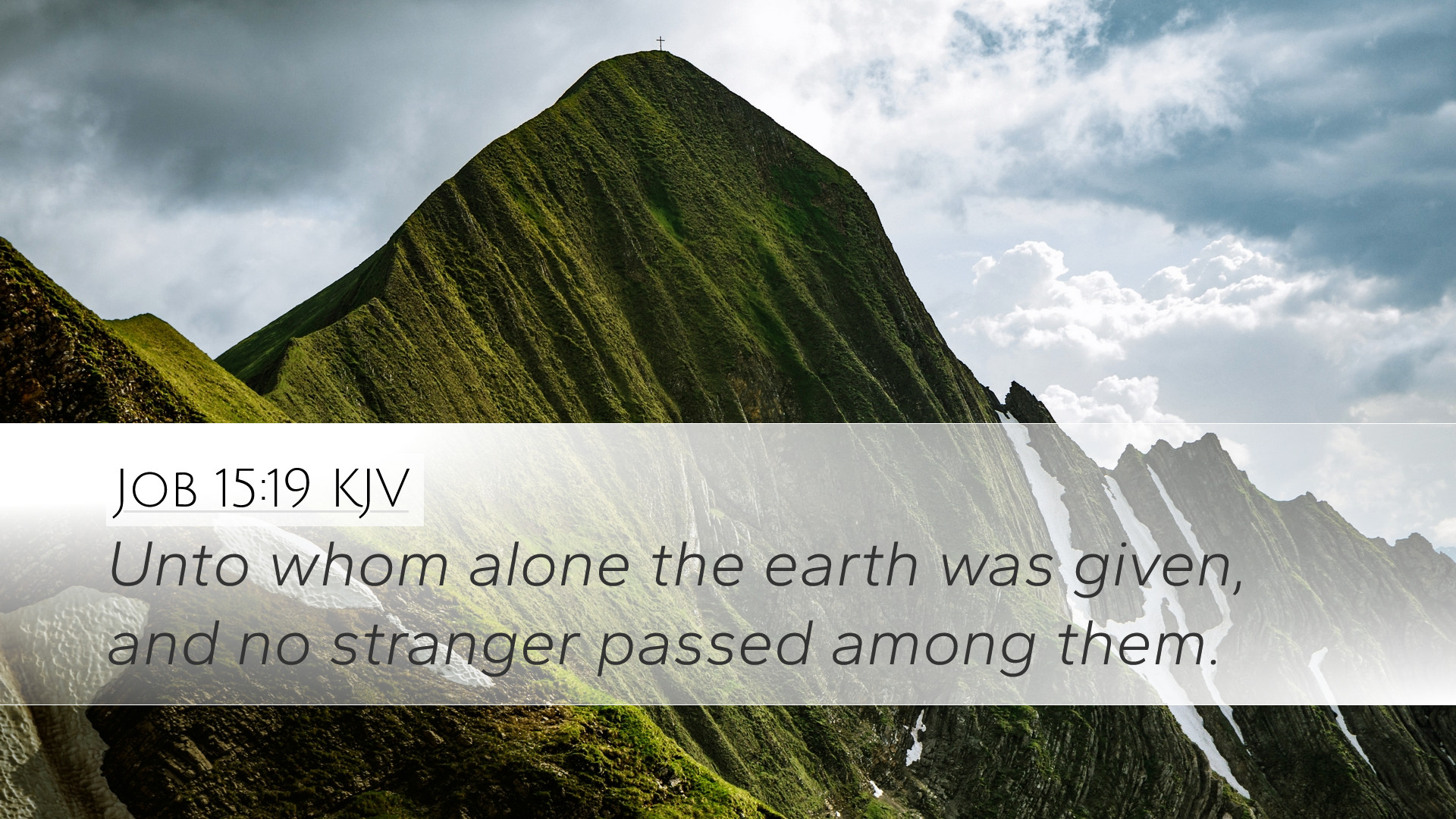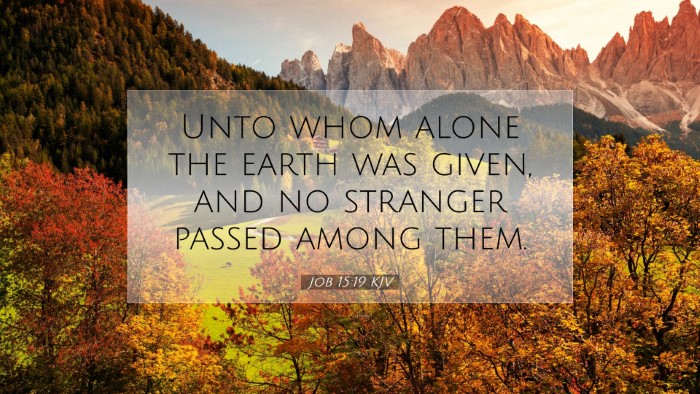Commentary on Job 15:19
Job 15:19 states: "Unto whom alone the earth was given, and no stranger passed among them." This verse is part of Eliphaz's discourse, in which he emphasizes the exclusivity of their understanding and the judgments of God concerning the righteous and the wicked. Eliphaz, speaking from his experiences and supposed wisdom, presents a perspective that invites deep theological reflection.
Context and Background
The Book of Job stands as a profound exploration of human suffering, righteousness, and the nature of God. Job, a man described as "blameless" and "upright," faces immense suffering and loss. Throughout the dialogues between Job and his friends, including Eliphaz, the theme of divine retribution emerges prominently. Eliphaz, representing the traditional view, believes that suffering is an indication of sin and a punishment from God.
Exegetical Insights
Eliphaz asserts that only the righteous inherit the earth, contrasting with the fate of the wicked, who are left out of God's favor. His claim that "the earth was given" to the righteous can be understood in the context of the biblical principle of inheritance. This principle is foundational in understanding covenantal relationships in biblical literature.
The Righteous and Their Inheritance
According to Matthew Henry, this verse encapsulates the idea that the land and such blessings are not randomly distributed but are instead lovingly granted to those who live in accordance with God's laws. The phrase "the earth was given" directly points to God's sovereign act of bestowing blessings, emphasizing that divine favor rests upon the righteous.
The Role of Divine Wisdom
Albert Barnes elaborates on the distinction between the righteous and the "stranger." He notes that the term "stranger" here denotes those who are outside the covenant relationship with God. This serves to remind the reader that divine wisdom is not accessible to those who live in disobedience or apart from God's commandments.
The Nature of God's Justice
According to Adam Clarke, this verse conveys that God has a unique plan for his people, and His justice is unwavering. Clarke emphasizes that the prosperity and blessing afforded to the righteous are part of God's redeeming plan. Conversely, the strife of the wicked serves to highlight the ultimate justice of God.
Theological Implications
This verse raises critical theological discussions about grace, justice, and divine sovereignty. The exclusivity implied by Eliphaz's assertion reflects a broader biblical narrative that points to God's covenantal relationship with Israel. It raises the question of how modern readers interpret the seemingly restrictive nature of God's blessings and favor.
Exclusivity and Inclusion
Eliphaz declares the exclusivity of God's blessings, suggesting that true wisdom and understanding are reserved for those in right standing with God. This position can be critically examined against New Testament teachings which often emphasize the inclusion of the Gentiles and the call to all humankind to partake in God’s grace through Christ.
God’s Sovereign Grace
Furthermore, the juxtaposition of the righteous versus the stranger invites reflection on the concept of grace. The New Testament reveals that grace is offered to all, yet Job's era was heavily focused on living according to God's commandments as a requirement for receiving His blessings. This Kreation highlights the evolution of understanding God's nature from the Old Covenant to the New Covenant.
Practical Applications
- Encouragement in Suffering: For those enduring trials, the assurance that God sees and knows the state of the righteous is encouraging. This echoes throughout Scripture, reassuring believers of God’s presence amid suffering.
- Call to Righteous Living: The verse serves as a reminder to strive for holiness and alignment with God's will. It calls for a commitment to uphold righteousness as part of the believer's identity.
- Understanding Divine Justice: Believers are encouraged to trust in God's ultimate justice, especially when circumstances challenge their understanding of His fairness. The wisdom in God's decisions surpasses human comprehension.
Conclusion
Job 15:19 encapsulates the broader themes of divine justice, the distinction between the righteous and the wicked, and the nature of God's blessings. Through the reflections of commentaries by Matthew Henry, Albert Barnes, and Adam Clarke, we gain deeper insight into how this verse connects with the overarching narrative of Scripture—challenging us to consider our own relationship with God and how we live in a world that often doesn't align with divine expectations. As scholars, pastors, and students of the Word, may we continually pursue a deeper understanding of God's character and our response to His sovereign grace.


